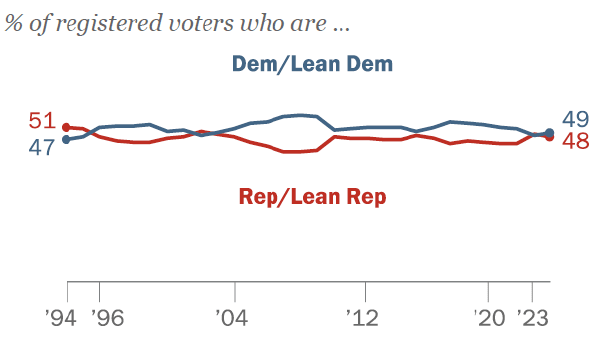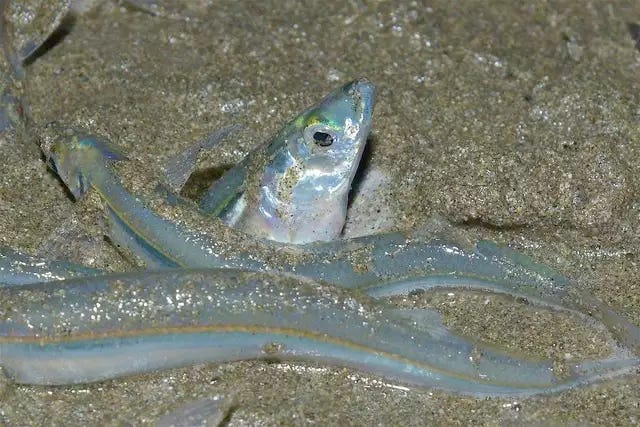Swiss women win climate case, grunion sex, registered voters evenly split between parties, tipping point for population decline, Long Covid research
April 15, 2024 - The Nett Report
Every other week, the award-winning Nett Report provides readers with thoughtful perspectives helpful to navigating life in a changing world. Past issues can be found here (recent) and here (past four years).
Political Divide
Registered voters now evenly split between the two major parties
New work by the Pew Research Center has found that registered voters are now evenly split between Democrats or lean to Democrats (49%) and Republicans or lean to Republicans (48%). In an April 9, 2024, post, Pew said “Four years ago, in the run-up to the 2020 election, Democrats had a 5-percentage point advantage over the GOP (51% vs. 46%). The share of voters who are in the Democratic coalition reached 55% in 2008. Some additional results:
About two-thirds of registered voters identify as a partisan.
Registered voters are roughly evenly split between those who say they are Republicans (32% of voters) and those who say they are Democrats (33%).
Roughly a third instead say they are independents or something else (35%), with most of these voters leaning toward one of the parties. Partisan leaners often share the same political views and behaviors as those who directly identify with the party they favor.
A greater share of registered voters say they are both ideologically conservative and associate with the Republican Party (33%) than say they are liberal and align with the Democratic Party (23%).
Bad reporting drives distrust in the media
A story in Newsweek on April 10, 2024, proclaimed, “Southern California to See Water Bills Double.” This is just another example of inaccurate reporting that drives distrust in media. The Metropolitan Water District of Southern California is a water wholesaler serving 26 water agencies that distribute that water. The households of the 19 million people served by those agencies pay an annual property tax fee, distributed monthly or bimonthly on their water bill. While the typical overall bill would be in the hundreds of dollars, this property tax assessment is doubling, not the water bill. The fee for Los Angeles County for a median-valued home is $28 a year and will double to $56, an increase of approximately $2.33 per month – hardly a doubling.
Future of Work / The Economy
The tipping point for population decline could be as early as 2030
A new study by the University of Washington’s Institute for Health Metrics and Evaluation estimates that the point at which the world population growth will dip below “replacement fertility” could come as soon as 2030. A story in Science on April 2, 2024, says the replacement rate to maintain population equilibrium is 2.1 children for each woman. The U.S. fertility rate is 1.6, and China and Taiwan are at 1.2. The implication for world population decline varies. “For middle- to high-income, low-fertility countries, falling below replacement level could mean labor shortages and pressure on health care systems, nationalized health insurance, and social security programs. Meanwhile, low-income countries that still have high fertility are at heightened risk of falling further behind on the world’s economic stage. They will not be able to make the necessary investments to improve health, well-being, and education with too few resources to support a booming population.”
California legislation would give workers the right to disconnect after hours
Today’s availability of instant communication from anywhere at any time has led to conditions where workers are called “all the time, nights and weekends included,” according to a story in the New York Times on March 30, 2024. New legislation in California would be “the first in the country to give employees the legal right to hit the ignore button on their phones when the boss calls after hours. Emails, texts, and other work communication could also be put off until workers are back on the clock.” Inspiration for the legislation came from Australia’s new right to disconnect law allowing “workers to reject ‘unreasonable’ professional communication outside of their regular workday. The idea originated in France and has spread in various forms to countries, including Canada, Italy, Belgium, and the Philippines. New York City debated a similar proposal in 2018, but didn’t adopt it.”
Boomers and Late Gen X men are unretiring
While workers are looking to disconnect from the pressures of work, an April 5, 2024, story in Fortune indicates that nearly a quarter of baby boomers or late Gen X men are unretiring. The reason: “money (or lack thereof) is the main driving force behind the trend, with inflation adding around $1,250 a year to households’ annual bills.”
Climate Change
Environmentalism could stop the clean-energy transition
An outcome I thought was a long time coming is starting to raise its head. According to The Washington Post Editorial Board, in an April 6, 2024, opinion, “Solar plants and wind farms, transmission lines and carbon-capture projects face opposition from conservationists and other environmental groups asking courts to stop new infrastructure from encroaching on wetlands, forests and other ecosystems. … ‘There are a couple of trillion dollars available to develop the clean-energy economy,’ noted Ted Nordhaus, who runs the Breakthrough Institute, a nonprofit supporting technological solutions to environmental challenges. ‘Except we can’t build anything.’” Rules that leaned toward staving off developers are now being used to stop the development of clean energy by largely local environmentalists intent on protecting their favored areas.
Swiss women win landmark climate case at Europe’s top human rights court
According to an April 9, 2024, story by Reuters, a group of over 2,000 senior Swiss women said their government’s inaction put them at risk of dying during heatwaves. The European Court of Human Rights ruled that “the Swiss government had violated the human rights of its citizens by failing to do enough to combat climate change.” The decision will likely set a precedent for future climate lawsuits and “is expected to resonate in court decisions across Europe and beyond.”
Lots of climate stories this week. Here’s a short summary,
California achieves 100% renewable energy for nearly two weeks, The Cool Down, April 15, 2024
Fashion's climate impact and how to reduce it, Volts, April 12, 2024 (video)
For mineral-rich Philippines, green metals rush is a balancing act, World Economic Forum, March 27, 2024
Billions at stake for resort towns as US ski season shrinks, TownLift, April 2, 2024
How the last 20 years of Sierra snowpack stack up, in one graphic, Los Angeles Times, April 1, 2024
80 Percent of Global CO2 Emissions Come From Just 57 Companies, Report Shows, Smithsonian Smart News, April 9, 2024
Health
Long Covid trials aim to help patients in need of relief
One of the lingering side effects of COVID has been the phenomena known as “Long Covid,” where patients have recovered from the initial effects of the disease but have continuing symptoms such as “overwhelming fatigue, difficulty thinking, shortness of breath, gastrointestinal complications, and headaches.” According to an April 11, 2024, story In Science, there are no proven treatments. Now, the University of California, San Francisco (UCSF) has “rigorously designed clinical trials of potential treatments.” About 30 patients are in the initial trials. “A number of studies have indicated some people with Long Covid do not fully clear SARS-CoV-2 from their body. Viral “reservoirs” show up in the gut, blood, and elsewhere. Now, scientists want to know whether wiping out that virus brings relief.”
How much water should you drink?
An April 13, 2024, story in CNET provides perspective on how much water you need to drink every day. The standard guide is eight glasses daily, but there is no scientific evidence to back it up. Adequate intake varies from person to person, according to the story. “Adequate intake includes water from non-water beverages, such as milk, sports drinks, tea, and yes, even coffee. It also includes water from fruits, vegetables, and other foods (think of how much water goes into a bowl of oats or soup).”
The Nett Light-Side
“You must do the things you think you cannot do.” - Eleanor Roosevelt
Thousands of grunion to hit the beach in Southern California
Along the Southern California coastline, we are familiar with a grunion run. According to an SF Gate story on April 12, 2024, “during the spring and summer months, grunion leave the water on certain nights following the new and full moons. that’s when … thousands of the tiny silver fish wash up on the beaches late at night. They writhe and splash under the moonlight, with one goal in mind: to have as much sex as possible.” The female grunion digs holes in the sand to deposit their eggs, and males circle around the females to “release their ‘milt,’ which flows down into the hole and fertilizes the eggs.”
Grandma Brain is a real thing
Apparently, grandmothers are geared to emotionally respond to their grandchildren even more than to their own children. According to a story in Good to Know on April 8, 2024, "What really jumps out in the data is the activation in areas of the brain associated with emotional empathy … That suggests that grandmothers are geared towards feeling what their grandchildren are feeling when they interact with them. If their grandchild is smiling, they’re feeling the child’s joy. And if their grandchild is crying, they’re feeling the child’s pain and distress.” When shown photos of their own children, their brains did not light up in the same way. It’s called Grandma Brain.
Eclipse, eclipse, and more eclipse

As if you didn’t get enough of the eclipse last week, I am going to give you some more. The image above is the best I have seen from an artistic perspective, and the one below shows the paths of totality for all eclipses in the contiguous U.S. from 1918 until 2106.
It’s not an eclipse, but an exploding Nova is on tap later this year
A Nova is a star that suddenly increases its light output tremendously and then fades away to its former obscurity. According to a story on earth.com, on April 13, 2024, a Nova will occur later this year in the Corona Borealis, a constellation located between Hercules and Boötes and 3,000 light years from Earth. Within the constellation, a white dwarf star and a red giant orbit each other closely. “The stars are close enough that as the red giant becomes unstable from its increasing temperature and pressure and begins ejecting its outer layers, the white dwarf collects that matter onto its surface. The shallow, dense atmosphere of the white dwarf eventually heats enough to cause a runaway thermonuclear reaction – which produces a Nova we see from Earth every eighty years or so. It last exploded in 1946, and scientists expect it to blow again later this year. After the explosion, the Nova cools down to its original temperature and restarts its cycle.
About Carl Nettleton
Carl Nettleton is an award-winning writer, speaker, thought partner, facilitator, and subject-matter expert regarding water, climate, sustainability, the ocean, and binational U.S.-Mexico border affairs. Nettleton Strategies, the consultancy he founded in 2007, is a trusted source of analysis and advice on issues at the forefront of public policy, business, and the environment. He helps people and organizations to think strategically about their options for change. He is also the founder of OpenOceans Global, a nonprofit addressing ocean plastic in a new way.










